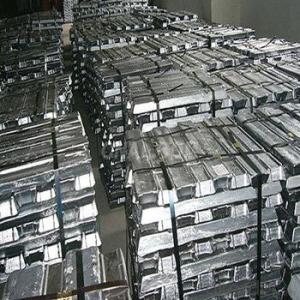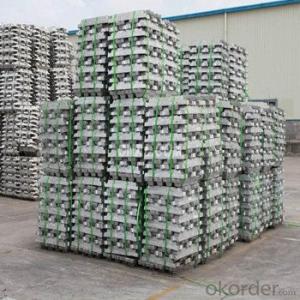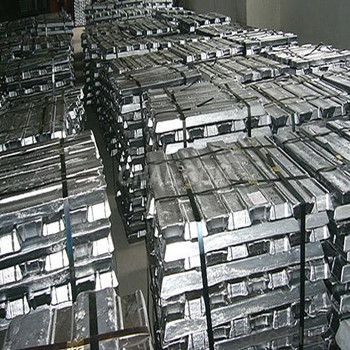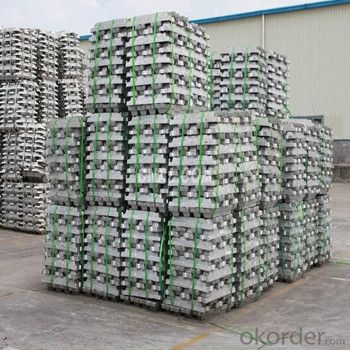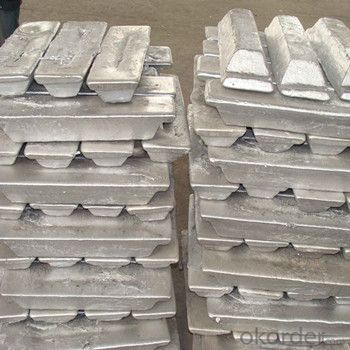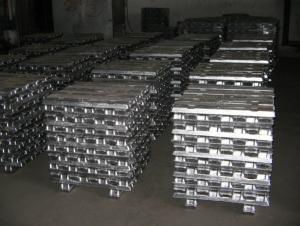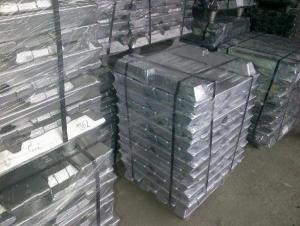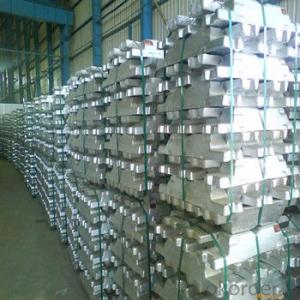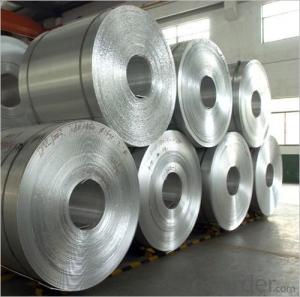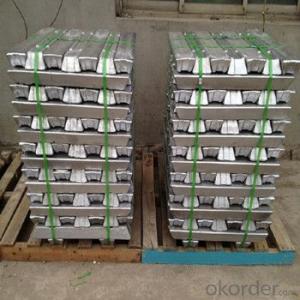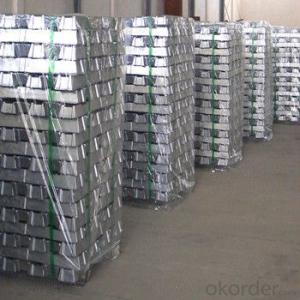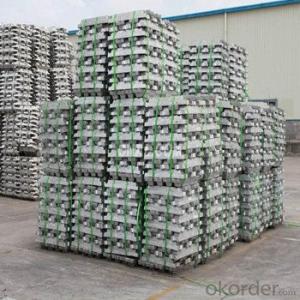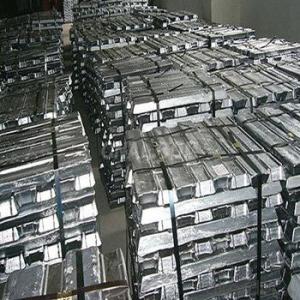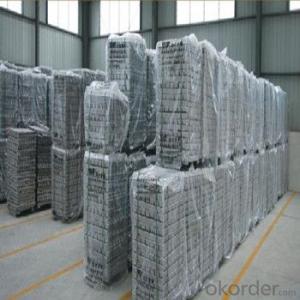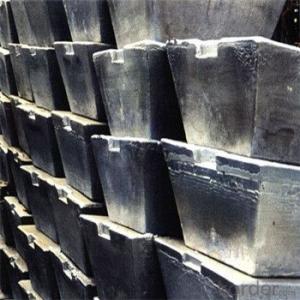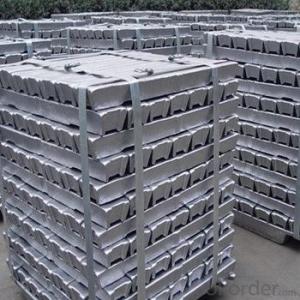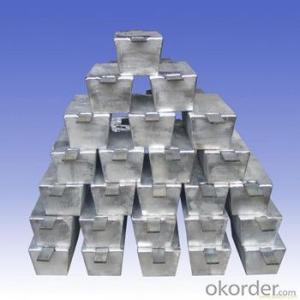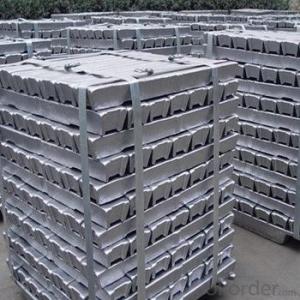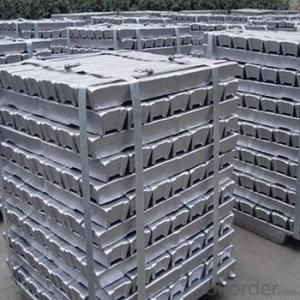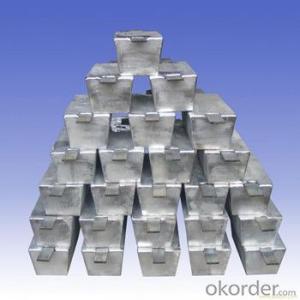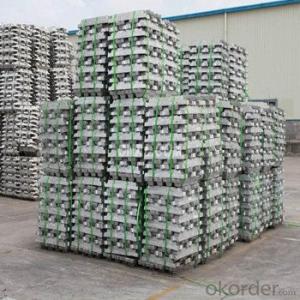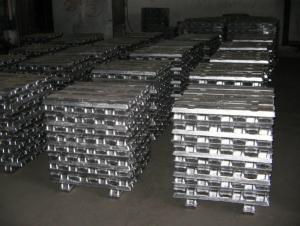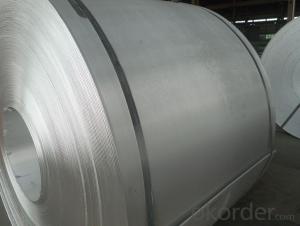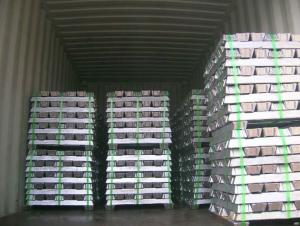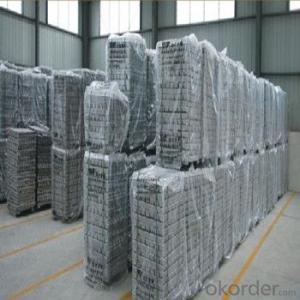Aluminum Pig/Ingot With 99.7% Putity For Choice
- Loading Port:
- China main port
- Payment Terms:
- TT OR LC
- Min Order Qty:
- 1000 m.t.
- Supply Capability:
- 100000 m.t./month
OKorder Service Pledge
OKorder Financial Service
You Might Also Like
Pure Aluminum Pig/Ingot Used for Industry
1.Structure of Aluminum Pig/Ingot
A material that has been cast into a shape in order to be transported and processed easier than in an unprocessed form. An ingot is typically rectangular in shape, which allows it to be stacked. Ingots are most commonly associated with metals, with ingots of gold held in the vaults of banks and brokerages being popular images.
Aluminum Ingot is with the AL as the main chemical composition.Aluminum Ingot is used for industry,such as automobile,pinning and weaving,electron broadly and so on. Aluminum Ingot has the following advantages: easy control and operation, fast melting.
2.Main Features of the Aluminum Pig/Ingot
•High Purity
•Easy control and operation
•High strength
•Fast melting
•Competitive price
•Best Service
3.Aluminum Pig/Ingot Images
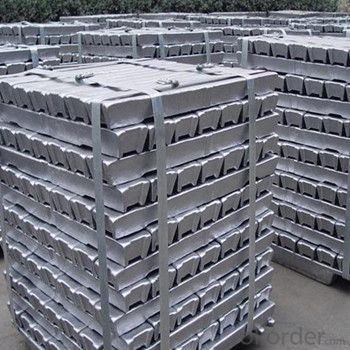
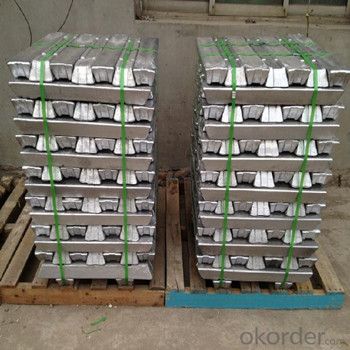
4.Aluminum Pig/Ingot Specification
Grade | Chemical Composition % | |||||||||
Al≥ | impurities ≤ | |||||||||
Si | Fe | Cu | Ga | Mg | Zn | Mn | others | Sum | ||
Al99.9 | 99.90 | 0.50 | 0.07 | 0.005 | 0.02 | 0.01 | 0.025 | - | 0.010 | 0.10 |
Al99.85 | 99.85 | 0.80 | 0.12 | 0.005 | 0.03 | 0.02 | 0.030 | - | 0.015 | 0.15 |
Al99.7 | 99.70 | 0.10 | 0.20 | 0.010 | 0.03 | 0.02 | 0.030 | - | 0.030 | 0.30 |
Al99.6 | 99.60 | 0.16 | 0.25 | 0.010 | 0.03 | 0.03 | 0.030 | - | 0.030 | 0.40 |
Al99.5 | 99.50 | 0.22 | 0.30 | 0.020 | 0.03 | 0.05 | 0.050 | - | 0.030 | 0.50 |
Al99.00 | 99.00 | 0.42 | 0.50 | 0.020 | 0.03 | 0.05 | 0.050 | - | 0.050 | 1.00 |
5.FAQ of Aluminum Pig/Ingot
We have organized several common questions for our clients,may help you sincerely:
①How about your company?
A professional factory which foucs on producing the aluminum pig,can meet customers' requiement to the quality and grade.The quality also have been accepted by customer.Already got the good reputation among the customers.It have gotten lot of much experience.The facrtory has the professional Technical Worker and the advanced equipments for production.Beside,it has the profesional teams to operate the whole proess for exporting.OEM service is availble and welcome.The items have beedn exported around the world,and have been acceptable among the customers,and have gotten the good reputation already.No matter from the quality,price and service,can be guaranteed for the cusgtomers.High purity and diffent grade are available.
②How to guarantee the quality of the products?
We have established the international advanced quality management system,every link from raw material to final product we have strict quality test;We resolutely put an end to unqualified products flowing into the market. At the same time, we will provide necessary follow-up service assurance.
③How long can we receive the prod rking days, We will arrange the factory delivery as soon as possible. The pecific time of receiving is related to the state and position of customers.Commonly 7 to 10 working days can be served.
- Q: What are the different forms of aluminum ingots available in the market?
- There is a wide range of aluminum ingots available in the market, each designed to cater to specific needs in various industries. The commonly found types are as follows: 1. Primary Aluminum Ingots: These ingots are produced by electrolytically reducing alumina, resulting in high-purity aluminum. They find applications in manufacturing processes across industries such as automotive, aerospace, and construction. 2. Secondary Aluminum Ingots: Made from recycled aluminum scrap, these ingots undergo melting and refining before being cast. They are cost-effective and environmentally friendly, making them popular in industries like packaging, electronics, and consumer goods. 3. Alloyed Aluminum Ingots: By adding specific alloying elements like copper, silicon, or magnesium during smelting or casting, these ingots offer improved mechanical properties, corrosion resistance, and other desired characteristics. They are used in applications like automotive parts, aircraft components, and building materials. 4. High-Purity Aluminum Ingots: These ingots are manufactured with exceptionally high levels of purity, often exceeding 99.99%. They are primarily used in industries that require ultra-clean and low-contamination materials, such as electronics, semiconductors, and solar panels. 5. Cast Aluminum Ingots: Produced through the casting process, molten aluminum is poured into molds and allowed to solidify, creating versatile ingots that can be further processed into different shapes and sizes. They are suitable for industries like automotive, construction, and marine. It is important to note that the availability of these aluminum ingot forms may vary depending on the specific market and region. Additionally, each type has its own advantages, disadvantages, and applications. Therefore, it is crucial to choose the appropriate form based on the intended use and requirements.
- Q: What is the average weight of an aluminum ingot?
- The average weight of an aluminum ingot varies depending on its size and shape. However, a common average weight for an aluminum ingot is around 25 to 30 pounds (11 to 14 kilograms).
- Q: How are aluminum ingots used in the production of consumer goods?
- Aluminum ingots are used in the production of consumer goods as a raw material for various manufacturing processes. They can be melted down and shaped into different forms such as sheets, bars, or rods, which are then used to create a wide range of products like cans, foils, kitchen utensils, automotive parts, electronics, and packaging materials. The lightweight and corrosion-resistant properties of aluminum make it a popular choice for consumer goods as it offers durability, flexibility, and energy efficiency.
- Q: What are the environmental benefits of using aluminum ingots?
- There are several environmental benefits associated with using aluminum ingots. Firstly, aluminum is a highly recyclable material. In fact, it is one of the most recycled materials in the world. By using aluminum ingots, we can promote a circular economy where the material can be reused and repurposed without significant degradation in quality. This reduces the need for extracting and processing new aluminum from bauxite ore, which requires significant energy and contributes to carbon emissions. Recycling aluminum ingots greatly reduces the energy and carbon footprint associated with its production. Furthermore, aluminum ingots have a relatively low weight compared to other materials, such as steel. This lightweight characteristic is advantageous in various industries, particularly automotive and aerospace. By using aluminum ingots instead of heavier materials, vehicles and aircraft can achieve better fuel efficiency, leading to reduced greenhouse gas emissions. Additionally, the lightweight nature of aluminum ingots allows for easier transportation and reduces fuel consumption during the logistics process. Another environmental benefit of using aluminum ingots is their resistance to corrosion. Aluminum naturally forms a protective oxide layer that helps prevent rust and degradation, making it highly durable and long-lasting. This means that products made from aluminum ingots, such as building materials or consumer goods, have a longer lifespan and require less frequent replacement. This reduces the overall demand for raw materials and minimizes waste generation. Lastly, aluminum ingots can contribute to energy savings in buildings. Aluminum is an excellent conductor of heat and electricity, allowing for efficient thermal management in construction. By using aluminum ingots in windows, doors, and other building components, energy consumption for heating and cooling can be reduced, leading to lower carbon emissions and decreased reliance on fossil fuels. In conclusion, the environmental benefits of using aluminum ingots include its recyclability, lightweight nature, corrosion resistance, and energy efficiency. By incorporating aluminum ingots into various industries and products, we can promote sustainability, reduce carbon emissions, and conserve natural resources.
- Q: How can aluminium ingots be cast into aluminium plates?
- Aluminum ingot is not suitable for casting aluminium plate directly. Even if the aluminum plate can be directly cast, its mechanical performance is not good, uneven thickness, poor surface quality.
- Q: What are the advantages of using aluminum ingots in the production of packaging materials?
- There are several advantages of using aluminum ingots in the production of packaging materials. Firstly, aluminum is lightweight yet sturdy, making it an ideal choice for packaging materials as it ensures easy handling and transportation while providing protection to the contents inside. Secondly, aluminum is a highly malleable metal, allowing for flexibility in design and customization of packaging shapes and sizes according to specific requirements. Additionally, aluminum is corrosion-resistant, ensuring the durability and longevity of packaging materials, even in harsh environments. Furthermore, aluminum has excellent barrier properties, effectively protecting the packaged goods from moisture, oxygen, and other external factors that could potentially degrade the product quality. Lastly, aluminum is a sustainable material, as it is easily recyclable without losing its properties, contributing to the circular economy and reducing the environmental impact of packaging waste.
- Q: Is it harmful to the human body to refine ingots from waste capacitors?
- Solvents, solutes, and additives, such as ethylene glycol, glycerin, boric acid and ammonia, are used for a long time.
- Q: I would like to ask, aluminum water poured into the mold, what should pay attention to? Aluminum solidification in the mold after the aluminum ingot, how can I get it out?
- One side of the mold is generally provided with a push plate, and the two modules are connected by hinges, and the other end is provided with a clip to prevent the aluminum water from expanding into the cavity.
- Q: How are aluminum ingots used in the production of aerospace components?
- The unique properties and characteristics of aluminum ingots make them crucial for aerospace component production. Melting and refining these ingots creates high-quality aluminum alloys designed specifically for the demanding requirements of the aerospace industry. Aluminum is widely used in aerospace manufacturing for several reasons. Its low density reduces the overall weight of aircraft, resulting in improved fuel efficiency and increased payload capacity. This is especially important in aerospace, where saving even a kilogram leads to significant cost savings and operational advantages. Another advantage of aluminum ingots is their excellent strength-to-weight ratio. By combining aluminum with elements like copper, magnesium, or zinc, aerospace engineers can create strong alloys while maintaining a low weight. These alloys are used to manufacture components like airframes, wings, fuselage sections, and structural supports that need to withstand extreme conditions and stresses during flight. Furthermore, aluminum ingots offer exceptional corrosion resistance, making them ideal for aerospace applications. Aircraft endure harsh environments with moisture, saltwater, and temperature fluctuations. The natural oxide layer on aluminum alloys derived from these ingots provides a protective barrier against corrosion, ensuring the longevity and durability of aerospace components. Additionally, aluminum ingots can be easily cast, machined, and formed into intricate shapes and designs, allowing for the production of complex aerospace components with high precision. This versatility is crucial in the aerospace industry, where specific needs and requirements of different aircraft models must be met. In conclusion, aluminum ingots are essential for aerospace component production due to their lightweight nature, excellent strength-to-weight ratio, corrosion resistance, and versatility in manufacturing processes. By utilizing these ingots and their derived alloys, aerospace manufacturers can achieve a perfect balance between performance, durability, and efficiency in their aircraft, contributing to the advancement and safety of the aerospace industry.
- Q: How can the sustainability practices in aluminum ingot production be enhanced?
- There are several ways in which the sustainability practices in aluminum ingot production can be enhanced. Firstly, the adoption of cleaner and more energy-efficient technologies can greatly reduce the environmental impact of the production process. This could involve the use of renewable energy sources, such as solar or wind power, to power the production facilities. Upgrading equipment and machinery to more energy-efficient models can also help minimize energy consumption and reduce greenhouse gas emissions. Secondly, optimizing the recycling and reuse of aluminum scrap and waste materials can significantly reduce the need for virgin aluminum production. Implementing effective recycling programs and investing in advanced recycling technologies can ensure that a higher percentage of aluminum is recovered from end-of-life products and incorporated back into the production process. This not only conserves valuable resources but also reduces the energy-intensive extraction and refining processes associated with primary aluminum production. Thirdly, improving water management practices can contribute to enhanced sustainability in aluminum ingot production. Implementing efficient water conservation measures, such as recycling and reusing water within the production process, can help minimize water consumption. Additionally, implementing wastewater treatment systems to remove pollutants and contaminants from the discharged water can prevent water pollution and protect local ecosystems. Furthermore, promoting transparency and responsible sourcing practices in the supply chain can enhance sustainability in aluminum ingot production. This includes ensuring that the raw materials used in the production process, such as bauxite and alumina, are sourced from responsible and sustainable mining practices. Implementing traceability systems and certification programs can help verify the origin and sustainability of these materials, ensuring compliance with ethical and environmental standards. Lastly, engaging with stakeholders, including employees, local communities, and industry associations, can foster a culture of sustainability and drive continuous improvement in aluminum ingot production. This can involve regular training and awareness programs on sustainable practices, as well as collaborating with suppliers and customers to identify and implement innovative sustainability solutions. Overall, enhancing sustainability practices in aluminum ingot production requires a holistic approach that combines technological advancements, efficient resource management, responsible sourcing, and stakeholder engagement. By implementing these measures, the aluminum industry can minimize its environmental footprint and contribute to a more sustainable future.
Send your message to us
Aluminum Pig/Ingot With 99.7% Putity For Choice
- Loading Port:
- China main port
- Payment Terms:
- TT OR LC
- Min Order Qty:
- 1000 m.t.
- Supply Capability:
- 100000 m.t./month
OKorder Service Pledge
OKorder Financial Service
Similar products
Hot products
Hot Searches
Related keywords
